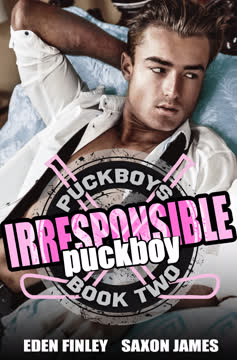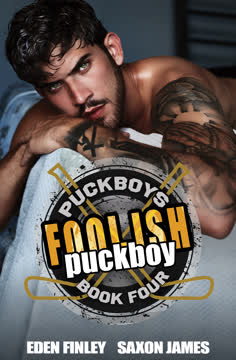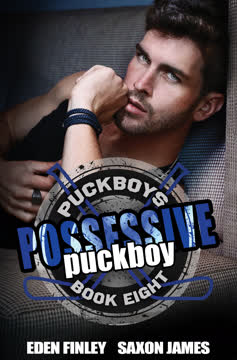Key Takeaways
1. Loyalty's Heavy Price
I’m not stupid enough to think that might exclude me.
A hidden burden. Knox Addison, a referee for the professional women’s hockey league (PWHL) and aspiring NHL official, carries a secret: a deep, long-standing crush on Easton Kikishkin, his best friend Connor’s younger brother. This attraction is a constant source of internal conflict, as Knox views Connor as a pseudo-brother and fears betraying their bond. His loyalty to Connor, who is fiercely protective of Easton, creates an invisible barrier, making him believe that pursuing his feelings for Easton would lead to dire consequences, potentially even violence from Connor.
Self-sabotage and denial. This intense loyalty often leads Knox to self-sabotage his own desires. He actively suppresses his attraction to Easton, even when Easton openly flirts with him, dismissing it as mere teasing or a way to annoy Connor. This denial extends to his own career, where he often takes the easier path rather than pushing for his full potential, perhaps subconsciously fearing that success might further complicate his already strained emotional landscape with the Kikishkin brothers.
The "cockblocking" dilemma. The conflict escalates when Connor, unaware of Knox's true feelings, enlists him to "cockblock" Easton during a charity hockey event in Vegas, fearing Easton's newfound freedom as an openly queer athlete might lead to public scandals. Knox agrees, seeing it as a twisted opportunity to keep Easton close, but this decision only deepens his guilt and the internal struggle between his loyalty to Connor and his overwhelming desire for Easton.
2. The Quest for Autonomy
Oppressing someone with love is still oppression.
Suffocating protection. Easton Kikishkin, an NHL player, yearns for independence from his overprotective family, particularly his older brother, Connor. While he acknowledges their love and sacrifices, he feels stifled by their constant oversight, especially regarding his recently revealed queer identity. This "love" feels like a form of oppression, preventing him from making his own choices and experiencing life on his own terms, free from judgment or control.
Rebellion and self-discovery. Easton's frustration manifests in a desire for recklessness and a willingness to embrace "scandals" if it means asserting his autonomy. He openly flirts with Knox, partly to annoy Connor, but also as a desperate plea for attention and a test of boundaries. His decision to request a trade from his team, even if it means moving to a less competitive one, is a direct act of rebellion against the suffocating family dynamic, a desperate attempt to carve out his own space and identity.
The burden of expectation. The "Kiki brothers" brand, while beneficial for their careers, adds another layer of pressure. Easton feels constantly compared to Connor and struggles to be seen as an individual rather than just "Connor's little brother." This constant comparison fuels his desire to break free and establish his own legacy, separate from the family's collective identity.
3. The Peril of Unspoken Desires
I’ve had feelings for you for close to half my life, and I don’t know how to be me without them.
A long-held secret. Easton's confession to Knox, made during a drunken night in Vegas, reveals the depth of his feelings: a crush that began at age twelve and evolved into a full-blown obsession. This admission, however, is initially met with a hesitant rejection from Knox, who is still bound by his loyalty to Connor. The unspoken nature of their mutual attraction, coupled with Knox's internal conflict, creates a painful dynamic where both men are aware of the underlying tension but unable to act on it.
The weight of the "brother" label. For years, Knox has consciously avoided seeing Easton as anything more than Connor's younger brother, a protective mechanism to maintain his friendship. This self-imposed boundary, while intended to prevent conflict, inadvertently causes more pain. When Easton confronts Knox about his "cockblocking" efforts, the revelation that Knox's actions were driven by his own suppressed desire, rather than just Connor's orders, makes the situation "so much worse" for Easton, highlighting the emotional toll of their unspoken truths.
A fragile connection. The initial kiss between them, though passionate, is immediately followed by Knox's retreat, reinforcing Easton's belief that he is perpetually off-limits. This push-pull dynamic, fueled by years of suppressed feelings and the looming shadow of Connor's disapproval, leaves both men in a state of emotional limbo, unable to fully commit to or move on from their profound connection.
4. Consequences of Overprotection
The fact you don’t know is how we got here.
Blinded by good intentions. Connor's overprotective nature, ingrained since childhood due to parental expectations, blinds him to the negative impact he has on Easton. He genuinely believes he is doing what's best for his brothers, meticulously managing their public image and personal lives. However, this constant interference, exemplified by his "cockblocking" scheme with Knox, leads to Easton's deep resentment and ultimately, a physical altercation on the ice during practice.
A painful awakening. The fight forces a confrontation where Easton explicitly tells Connor that his overbearing behavior is the reason for his poor performance and desire for a trade. This revelation, coupled with their parents' surprising admission that they were aware of Easton's crush on Knox and Connor's role in stifling it, shatters Connor's perception of himself as the "good boy" and protective older brother. He realizes his actions have caused significant unhappiness for those he loves most.
The ripple effect. Connor's misguided protection not only strains his relationship with Easton but also inadvertently affects Knox. By enlisting Knox in his schemes and creating an environment where Knox felt he couldn't pursue his feelings, Connor unknowingly contributed to Knox's own emotional turmoil and self-doubt. The fight serves as a catalyst, forcing Connor to confront the unintended consequences of his actions and the need for a fundamental shift in his approach to his brothers' lives.
5. Reconciliation Through Vulnerability
I’m so sorry.
A breaking point. After Easton's outburst and trade request, Connor is devastated, realizing the extent of his brother's unhappiness. When Knox, feeling immense guilt over his role in the "cockblocking" and the secret kiss, finally confesses his long-held feelings for Easton to Connor, it pushes Connor to his emotional limit. Instead of anger, Connor expresses profound remorse, acknowledging his own mistakes and the pain he has caused.
Permission to pursue. In a surprising turn, Connor, grappling with his own identity crisis as the "overbearing" brother, gives Knox his blessing to pursue Easton. This act of vulnerability and self-awareness from Connor is a pivotal moment, removing the primary obstacle that had kept Knox and Easton apart for years. It signifies Connor's willingness to step back and allow his brothers the freedom they crave, even if it means personal discomfort for him.
A new foundation. This raw honesty, though painful, lays the groundwork for healing within their complex relationships. Connor's apology and acceptance allow Knox to finally shed his guilt and openly pursue Easton, while also opening a path for Connor to redefine his role within the family, moving from a controlling figure to a truly supportive one.
6. Embracing Personal Ambition
This will take me one step closer to the big leagues.
A dream within reach. Amidst the emotional turmoil, Knox receives a life-changing offer: a full-time refereeing position in the AHL, with the potential for NHL crossover games. This opportunity represents the culmination of years of hard work and dedication, a chance to finally achieve his childhood dream of being on the ice at the highest level, even if not as a player. It's a significant step up from his current PWHL role and part-time server job, offering financial stability and professional growth.
The internal struggle continues. Despite the excitement, Knox is immediately conflicted. The new role involves extensive travel, threatening the fragile, budding relationship with Easton. He grapples with the fear of failure, the pressure of a demanding schedule, and the potential for his career to drive a wedge between him and Easton. This echoes his past decision to walk away from a potential playing career, highlighting his recurring self-doubt when faced with significant challenges.
A calculated risk. Ultimately, Knox accepts the position, recognizing it as a crucial step for his future. He understands that pursuing his dream might mean sacrificing some aspects of a conventional relationship, but he is determined to make it work with Easton. This decision marks a turning point for Knox, as he begins to prioritize his own ambitions while simultaneously committing to fighting for the love he has found.
7. Love's Unconventional Path
I want realistic love with you.
Beyond the fairytale. After the initial excitement and subsequent anxieties about their future, Easton confronts Knox with a profound realization: he doesn't want a fairytale romance, but "realistic love." He acknowledges the immense challenges their careers and travel schedules will pose, rejecting the notion of a perfect, effortless relationship. This shift in perspective is born from years of pining and the recent taste of genuine connection, making him willing to fight for a love that is messy, demanding, but ultimately real.
A commitment to effort. Easton's "realistic love" proposal is a plea for mutual effort and unwavering commitment despite the obstacles. He understands that their relationship won't fit conventional molds, but he believes their deep connection and long-standing feelings are worth the struggle. He challenges Knox's hesitation, emphasizing that their bond has endured years of separation and unspoken desires, making the current challenges seem surmountable if they both choose to actively work at it.
Prioritizing the person. This declaration signifies Easton's maturity and his willingness to prioritize Knox over the idealized version of independence he once sought. While he still desires autonomy, he recognizes that true fulfillment includes a deep, committed partnership. His willingness to navigate the complexities of their professional lives and personal desires demonstrates a profound understanding that love, especially one as long-awaited as theirs, requires constant negotiation and a shared commitment to making it work.
8. The Power of Mutual Effort
I’m going to do everything in my power to make sure we’re both happy, even if I’m terrified of failing and hurting you.
A shared commitment. Faced with Easton's heartfelt plea for "realistic love," Knox sheds his remaining doubts and fully commits to their relationship. He acknowledges his fears of failure and heartbreak but declares his unwavering determination to make them both happy. This mutual commitment, born from years of suppressed feelings and recent honest conversations, transforms their tentative connection into a solid partnership.
Strategic planning for distance. To demonstrate his commitment, Knox immediately begins meticulously planning how they can make their long-distance, demanding careers coexist with their relationship. He creates detailed schedules, mapping out their travel and off-days to maximize their time together. This proactive approach, a stark contrast to his earlier hesitation, shows Easton that Knox is not just verbally committed but is actively investing in their future.
Overcoming past patterns. This commitment marks a significant personal growth for Knox, who has a history of "cutting and running" when faced with challenges. By choosing to fight for Easton and actively work through the logistical complexities, he breaks free from old patterns of self-sabotage and embraces the vulnerability required for a deep, lasting connection. Their shared determination to prioritize each other, even amidst the chaos of professional hockey, becomes the foundation of their "realistic love."
9. Navigating Professional Boundaries
Once you put on the stripes, everyone else out there is a stranger to you.
The impartiality mandate. As an aspiring NHL referee, Knox faces strict rules regarding impartiality, especially concerning players he knows personally. His boss, Ron Dailey, explicitly states that once he puts on his stripes, all players, including Connor and Easton, must be treated as strangers. This rule, designed to maintain the integrity of the game, creates a unique challenge for Knox, who is now dating a player.
Ethical considerations. Knox understands the gravity of this professional boundary. He knows that any perceived bias could jeopardize his career and cast a shadow over Easton's. He proactively informs Ron about his relationship with Easton, demonstrating his commitment to ethical conduct and transparency. This honesty, though risky, is crucial for building trust with his new employer and ensuring his long-term success in the league.
Sacrifice for the dream. While the relationship with Easton is paramount, Knox also recognizes the immense opportunity before him. He accepts being pulled from games involving Colorado, a direct consequence of his relationship, but views it as a necessary sacrifice to prove his impartiality and dedication to his dream job. This decision underscores the "realistic" aspect of their love, where both partners understand and respect the demands of each other's careers.
10. Family Growth and Acceptance
You can still be protective of your brothers without dictating their lives.
Redefining protection. Easton's parents, initially seen as overbearing "momagers" of their sons' hockey careers, reveal a surprising depth of understanding. They acknowledge their role in fostering Connor's overprotectiveness and admit they wanted Easton to be "mature enough to handle the backlash" of coming out, but never intended to stifle his personal life. This conversation marks a turning point, as they encourage Connor to redefine his protective instincts, shifting from control to genuine support.
Connor's transformation. Connor, initially resistant and defensive, begins a journey of self-discovery. He grapples with the realization that his actions, though well-intentioned, have caused pain and resentment. His vulnerability and willingness to admit his mistakes, coupled with his eventual acceptance of Knox and Easton's relationship, demonstrate significant personal growth. He learns that true love and support mean allowing his brothers the freedom to make their own choices, even if it's difficult for him.
A new family dynamic. The family's journey through conflict and reconciliation ultimately strengthens their bonds. The parents' newfound openness, Connor's evolving understanding of boundaries, and Easton's assertion of independence create a more balanced and accepting dynamic. This growth allows for a more authentic expression of love and support, paving the way for Easton and Knox to pursue their unconventional relationship with the blessing of their family.
Last updated:
Review Summary
Forbidden Puckboy received mixed reviews, with an average rating of 3.78 out of 5. Some readers enjoyed the romance and character interactions, particularly the cameos from other characters in the series. However, many found the relationship development lacking and the forbidden aspect underwhelming. Critics cited repetitive internal monologues, a weak plot, and underdeveloped chemistry between the main characters. While some praised the low-angst approach, others felt it diminished the romantic tension. The book's reception was polarized, with fans of the series generally more forgiving than newcomers.
Puckboys Series
Download PDF
Download EPUB
.epub digital book format is ideal for reading ebooks on phones, tablets, and e-readers.












